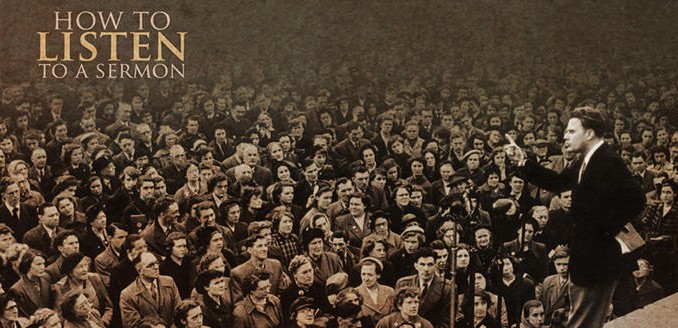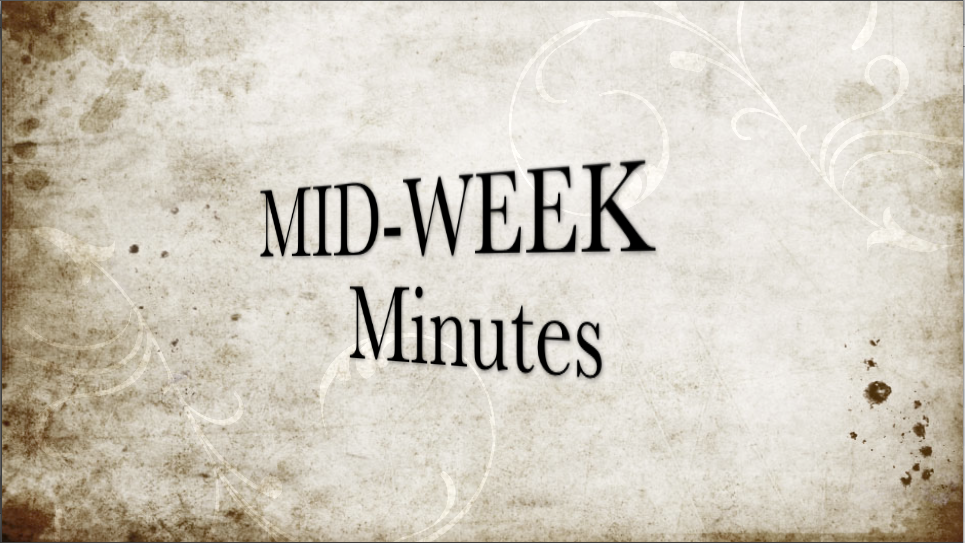
by Bret Capranica | Apr 7, 2011 | Featured Articles, Preaching, Worship
Carefully Think Read through the following passages and think about what they about the importance of listening: Matthew 11:5; 13:9, 15, 16, 43; 15:10; 17:5; Mark 7:14; Luke 9:44; 16:29; Acts 2:22; 7:57; 13:16; 15:13; 22:1; Romans 11:8; James 2:5 Read the parable of the soils in Matthew 13:1-9; 18-23. Circle every reference to hearing. What does a person”™s hearing indicate about their soul? Read James 1:19-25 and note what is important about our listening to God”™s word. Prayerfully Meditate What are the biggest barriers to how effectively you listen to a sermon? What do you do to prepare yourself to listen to a sermon on Sunday? Why? What do you do with the material you have heard in a sermon ? How could you spend your time on Saturday evening and Sunday morning to best prepare yourself to listen well on Sunday? Actively Respond Read again through Psalm 119:33-40 and think about the importance of hearing God’s Word and the role it actually plays in your own life. Pray for those who will gather on Sunday to be effective listeners. Pray for those who will be leading the church in our corporate gathering on Sunday. Pray that they will have a focused attention in leading the entire church in a biblical manner. Pray for all who will be involved in the service (instrumentalists, sound technicians, ushers, etc.). Pray that we will help to enhance people”™s affections for God this week in how we serve the body. Meditate on the lyrics of the songs we will sin Sunday. Download the songs for this Sunday and listen to them so...

by Bret Capranica | Apr 7, 2011 | Preaching
The Westminster Confession Larger Catechism states: ‘It is required of those that hear the Word preached that they attend upon it with diligence, preparation and prayer; examine: What they hear by the Scriptures; receive the truth wiht faith, love, meekness, and readiness of mind, as the Word of God; meditate, and confer of it; hide it in their hearts, and bring forth the fruit of it in their lives. quoted in Ken Ramey, Expository Listening,...

by Bret Capranica | Apr 7, 2011 | Preaching
[Timothy Turner] explains how TV watching and preaching are diameterically opposed to one another – one is visual, the other is rational; one invovles the yes, the other invovles the ears; one creates passive watchers, the othr requires active hearers. Thurner explains how TV fosters idelness and passivity by providing information that requires no response, whereas preaching seeks to generate some kind of change. If you are not careful, watching TV will turn you into a lazy listener who just sits there on the couch and takes in information and doesn’t have to do anything with it. Typically people tune in to TV to tune out. They disengage their brain and expect to be entertained and amused. The fast-paced images and sound bites have shortened people’s attention spans and created a passive spectator mentality where people are viewers rather than hearers and doers. After watching TV and going to the movies an surfing the Internet all week long, you come to church and have to sit and listen to a lengthy sermon that requires a great deal of concentration and exertion you aren’t used to. You’re expected to go from being a passive viewer to an aggressive listener literally overnight. Ken Ramey, Expository Listening, 42 (speaking of Timothy Turner’s book Preaching to Programmed People: Effective Communication in a Media-Saturated...

by Bret Capranica | Apr 6, 2011 | Preaching
Even when preaching the Word of God does not soften and save and heal, it is not necessarily ineffective. This preaching of the Word may be doing God’s terrible work of judgment. It may be hardening people, and making their ears so dull that they will never want to hear again. . . . Don’t be cavalier in the hearing of God’s Word week after week. If it is not softening and saving and healing and bearing fruit, it is probably hardening and blinding and dulling. John Piper, “Take Care How You Listen,” Part 1, Part 2 – quoted in Expository Listening, Ken...

by Bret Capranica | Apr 6, 2011 | Pastoral Ministry, Preaching, Worship
Mid-Week Minutes 4-6-11 from Summit Woods on...












